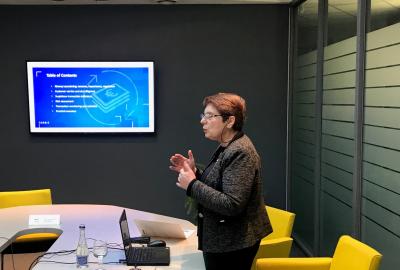News
Jan 03, 2019
Billions are being laundered: what’s new at the front line of combating money laundering?
There are numerous cases worldwide when criminal groups and individuals sought to legalise dirty money or integrate it into a legal financial system. According to the data of the United Nations Organisation, the amount of money laundered worldwide every year is from USD 800 billion to 2 trillion. These amounts correspond to 2–5 per cent of the global GDP.
Suspicious actions are often overlooked
Experts of the “Fortytwo Data” company of anti-money laundering solutions in Great Britain have determined that within the last decade 18 out of 20 biggest banks in Europe were subject to penalties for breaching anti-money laundering regulations. Thus, the belief that the majority of these cases occur at the financial institutions in developing countries, where control is weaker, is wrong.
Birutė Žalalienė, the specialist at the “Forbis” company organising anti-money laundering training for representatives of financial institutions, states that money laundering and other financial crimes is one of the biggest threats that financial institutions currently face, and therefore they must appropriately prepare to protect themselves and their customers.
“Banks and other financial institutions often simply fail to ensure that anti-money laundering measures are complied with due to the lack of competence of their employees. Of course, this does not exempt them from responsibility, and therefore financial institutions should devote sufficient resources for the prevention of illegal cash transactions, should use specific technical measures and constantly train employees”, says the anti-money laundering specialist and reminds us that anti-money laundering requirements for financial institutions are becoming stricter in the European Union every year.
FinTech innovations are useful for the prevention of money laundering
The European Commission has recently adopted the 5th Anti-Money Laundering directive that provides for the closer cooperation of controlling institutions in different countries, by focusing on virtual currencies and new safeguards for transactions from higher risk third countries.
Žalalienė claims that the focus on anti-money laundering is also increased due to innovations in the field of financial technologies.
“Opening the financial service market to new participants in many cases is useful for consumers who are able to use financial services more conveniently and at more competitive prices. However, supervisory institutions have more work as a result. They must ensure that payment companies operate smoothly and avoid turning into a tool for individuals and organisations involved in money laundering”, Žalalienė tells.
Advises to take a closer look at laws
According to Žalalienė, new technologies make it possible to ensure the security and transparency of financial transactions, but the problem is that new market participants have significantly less experience in the field of anti-money laundering than traditional banks.
“For this reason they are facing a risk of becoming a target for individuals or organisations that are interested in money laundering and, at the same time, the focus of controlling institutions. For this reason not only the banks operating in Lithuania, but also financial companies and start-ups should familiarise themselves with laws on Anti-money laundering and terrorist financing applicable in the country, resolutions of the Bank of Lithuania and EU legal acts regulating this field”, says the anti-money laundering specialist.
Žalalienė also distinguishes the most important obligations related to anti-money laundering that apply to every financial market participant.
“These include performance of appropriate customer check and registration and monitoring of transactions, and contracts performed by customers. It is necessary to constantly check whether transactions performed by customers do not contain characteristics of suspicious activities, ensure the implementation of international sanctions. Moreover, it is necessary to report information on suspicious transactions to the Financial Crime Investigation Service (FNTT), continuously perform personnel training in the field of anti-money laundering and to officially appoint a person—an executive—who would organise the performance of prevention measures”, lists Žalalienė.
